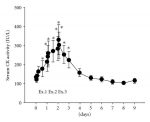JaimeS
Senior Member
- Messages
- 3,408
- Location
- Silicon Valley, CA
Hey, everyone!
So I've heard that high creatine kinase is present where there's muscle breakdown, and several references list high creatine kinase as a marker for ME. But my creatine kinase is a little low. It's at that lab-limbo where some reference ranges consider it clinically low and others don't (mine is 31 U/L).
It turns out that low creatine kinase appears to be associated with:
Orthostatic intolerance
SLE (in this article, 'low' is defined as less than 33 U/L).
Muscle weakness in RA
Breast Cancer
I haven't seen mention of lower creatine kinase in patients with ME or CFS, and perhaps I just haven't been looking hard enough - I would love some links, if anyone knows about low creatine being discussed elsewhere. Since creatine kinase catalyzes the reaction of ADP --> ATP, low values may help explain why some CFS or ME patients are so fatigued. If you want to find out more about creatine kinase, look at the abstract of this article: "The creatine kinase system and pleiotropic effects of creatine", by Wallimann et al, 2011.
I did find an older article that looked at 10 ME patients and found that their creatine kinase levels "were not elevated", but when I looked at the text of the article, there was no lower value for CK at that time, and most of the ME patients examined had creatine kinase in the mid-thirties or lower, over half clinically low.
The high vs low debate may end up being another difference between the acute stage vs the exhaustion stage, as discussed by Hornig et al.
I have data from less than a year ago that shows my creatine kinase to be quite normal (in the 60s). I wish I had it taken six months before that, because if my hypothesis is correct, it would have been higher than normal at that time. Sadly, there's no way to tell.
Does anyone have additional data? Anyone know whether their creatine kinase is high, or low, or was high/normal and is now low?
[Edited for clarity!]
-J
So I've heard that high creatine kinase is present where there's muscle breakdown, and several references list high creatine kinase as a marker for ME. But my creatine kinase is a little low. It's at that lab-limbo where some reference ranges consider it clinically low and others don't (mine is 31 U/L).
It turns out that low creatine kinase appears to be associated with:
Orthostatic intolerance
SLE (in this article, 'low' is defined as less than 33 U/L).
Muscle weakness in RA
Breast Cancer
I haven't seen mention of lower creatine kinase in patients with ME or CFS, and perhaps I just haven't been looking hard enough - I would love some links, if anyone knows about low creatine being discussed elsewhere. Since creatine kinase catalyzes the reaction of ADP --> ATP, low values may help explain why some CFS or ME patients are so fatigued. If you want to find out more about creatine kinase, look at the abstract of this article: "The creatine kinase system and pleiotropic effects of creatine", by Wallimann et al, 2011.
I did find an older article that looked at 10 ME patients and found that their creatine kinase levels "were not elevated", but when I looked at the text of the article, there was no lower value for CK at that time, and most of the ME patients examined had creatine kinase in the mid-thirties or lower, over half clinically low.
The high vs low debate may end up being another difference between the acute stage vs the exhaustion stage, as discussed by Hornig et al.
I have data from less than a year ago that shows my creatine kinase to be quite normal (in the 60s). I wish I had it taken six months before that, because if my hypothesis is correct, it would have been higher than normal at that time. Sadly, there's no way to tell.
Does anyone have additional data? Anyone know whether their creatine kinase is high, or low, or was high/normal and is now low?
[Edited for clarity!]
-J
Last edited:



